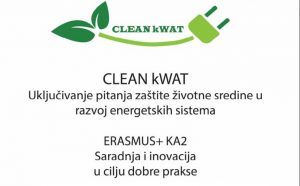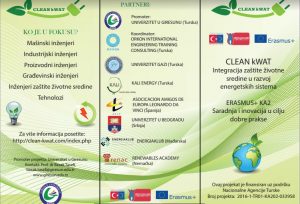The first results of the international CLEAN-kWAT project, in which the Faculty of Mechanical Engineering is a participant, have been recently presented at the 48th International Congress on Heating, Refrigeration and Air-Conditioning held in Belgrade. The basic aim of the project is to support the system of education of young engineers in the energy supply sector. The idea is to develop innovative materials which would help integrate environmental considerations into energy systems development. Some of the most important project results include developing training materials for young engineers, the e-learning portal and videos.
The participants of the Erasmus+ KA2 CLEAN-kWAT project are eight reputable scientific institutions, companies and NGOs from Turkey, Germany, Serbia, Spain and Hungary. The project is funded with support from the Turkish National Agency. The Faculty of Mechanical Engineering is implementing the project on behalf of the University of Belgrade.
 Since global warming is a direct result of the fossil fuel use, there are increasing efforts in Europe aimed towards defining an institutional and legislative framework for the development of energy systems that would be designed in keeping with the demands for environmental protection and preservation of natural resources, says Aleksandra Sretenović, Assistant Professor at the FME and the Head of the CLEAN-kWAT project. Therefore, special attention should be devoted to education, especially in the energy departments, which, unfortunately, in many universities still do not have sufficient number of obligatory courses related to the field of preservation of the environment.
Since global warming is a direct result of the fossil fuel use, there are increasing efforts in Europe aimed towards defining an institutional and legislative framework for the development of energy systems that would be designed in keeping with the demands for environmental protection and preservation of natural resources, says Aleksandra Sretenović, Assistant Professor at the FME and the Head of the CLEAN-kWAT project. Therefore, special attention should be devoted to education, especially in the energy departments, which, unfortunately, in many universities still do not have sufficient number of obligatory courses related to the field of preservation of the environment.
The aim of the European Qualification Framework (EQF) is to make National Qualification (NQF) understandable in Europe, which would allow better mobility of workers between countries and the development of a common educational system.
 The CLEAN-kWAT project will address precisely these issues, says Dr Sretenović. It will point to the required skills and competences for working in the energy supply sector through the development of the new learning outcomes and the improvement of the existing ones, as well as through the redefinition of the necessary competence standards. Based upon this, training modules will be developed and available at the e-learning platform. The main target group of the project includes energy systems designers and engineering students in the departments of energy systems engineering.
The CLEAN-kWAT project will address precisely these issues, says Dr Sretenović. It will point to the required skills and competences for working in the energy supply sector through the development of the new learning outcomes and the improvement of the existing ones, as well as through the redefinition of the necessary competence standards. Based upon this, training modules will be developed and available at the e-learning platform. The main target group of the project includes energy systems designers and engineering students in the departments of energy systems engineering.
(Source: Faculty of Mechanical Engineering)

